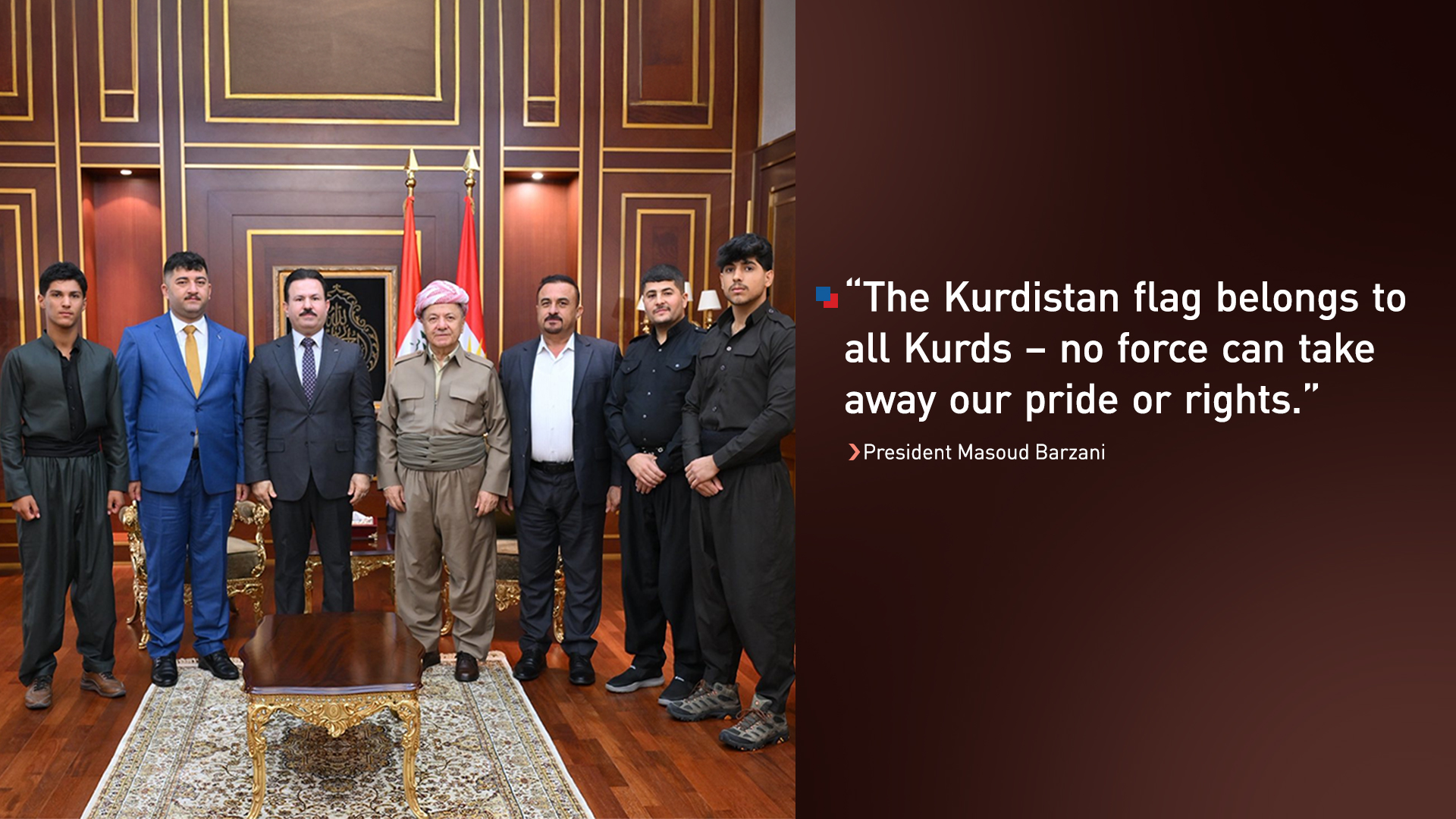President Masoud Barzani Condemns Iraqi Security Attack on Kurdish Youth Over Kurdistan Flag in Khurmato
Highlighting decades-long struggle for Kurdish rights and self-determination, Barzani reaffirms the constitutional and historical legitimacy of raising the Kurdistan flag.

ERBIL (Kurdistan24) — President Masoud Barzani on Saturday received a group of Kurdish youth from Khurmato district who had been assaulted by Iraqi security forces for raising the Kurdistan flag on election day, November 11. The meeting, held in Pirmam, underscored the ongoing struggle of the Kurdish people to assert their constitutional and historical rights within Iraq.
In the meeting, President Barzani praised the bravery and sense of Kurdish identity displayed by the youth, noting that countless sacrifices and lives have been devoted over decades to upholding the Kurdish flag and promoting the cultural and political rights of the Kurdish people.
“The Kurdistan flag belongs to all Kurds,” Barzani said. “Every Kurdish citizen has the legal and constitutional right to honor and take pride in the flag and sacred symbols of their people. No individual or institution has the authority to desecrate or prevent the raising of the Kurdistan flag, under any pretext.”
Masoud Barzani has played a pivotal role in the Kurdish quest for self-determination for more than four decades. From the early resistance movements against the dictator Saddam Hussein’s oppressive regime to negotiating the political framework that granted autonomy to the Kurdistan Region, Barzani has consistently championed the Kurdish people’s ethnic, cultural, political, and educational rights.
Despite the 2003 fall of Saddam Hussein and the drafting of a new Iraqi constitution in 2005, which formally recognized the Kurdistan Region and permitted the use of its flag, successive Iraqi governments have repeatedly violated Kurdish rights.
State security forces belonging to the central governments in Baghdad and other armed militias outside the state's control have often attempted to suppress Kurdish identity, restricting the raising of the Kurdistan flag, and targeting Kurdish institutions in the Kurdistan provinces, districts, and sub-districts outside the administrative control, of the Kurdistan Regional Government (KRG), and, as in the Khurmato case, employing violence against citizens exercising their constitutional rights.
The recent assault on Kurdish youth in Khurmato is emblematic of a long-standing pattern. Historically, Kurdish citizens have faced systemic obstacles to expressing national identity, from cultural suppression and educational restrictions to armed repression.
Today, even with legal recognition of the Kurdistan Region and the flag’s constitutional legitimacy, Iraqi authorities continue to challenge Kurdish symbols, reflecting a persistent centralist mindset resistant to genuine autonomy and equality.
Observers note that such incidents are not isolated but rather part of a broader, ongoing policy by Baghdad to limit Kurdish self-expression and undermine regional governance. This environment not only threatens Kurdish civil and political rights but also undermines the federal principles enshrined in the Iraqi constitution.
Throughout these challenges, President Barzani has remained a steadfast defender of Kurdish rights, navigating political negotiations while emphasizing the importance of unity, lawful resistance, and institutional development.
Under his leadership, the Kurdistan Region has made remarkable strides in education, governance, and economic development, providing its citizens with opportunities far surpassing those available in other parts of Iraq, where security, political representation, and public trust remain limited.
By publicly supporting the youth of Khurmato, Barzani reaffirmed that Kurdish identity, pride, and legal rights cannot be curtailed by intimidation or violence.
The incident serves as a stark reminder of the ongoing struggle for self-determination and the resilience of the Kurdish people in the face of continued oppression from Baghdad.